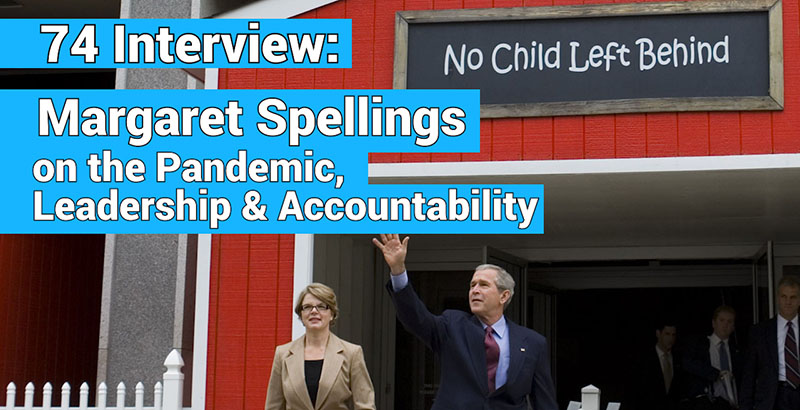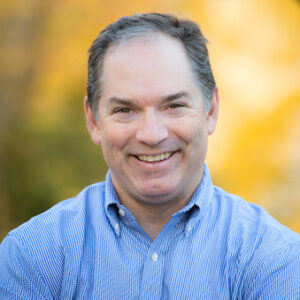74 Interview — Former Secretary of Education Margaret Spellings Implores Federal Leaders to Unite: ‘You’ve Got to Bring People Together Before You Can Start Solving Problems’

Margaret Spellings has been a senior aide at the White House, a college president, and secretary of education for President George W. Bush from 2005 to 2009. She’s been in the middle of crises, from 9/11 to the mass shooting at Virginia Tech and the aftermath of Hurricane Katrina.
Though not a Texan by birth, Spellings is certainly one by temperament and commitment. Now leading Texas 2036, a data-driven policy effort pegged to the state’s bicentennial, her work and life have been upended by coronavirus.
We talked with Spellings about coronavirus and best- and worst-case scenarios, what businesses should do to help schools, her advice for U.S. Secretary of Education Betsy DeVos and, most importantly in the Lone Star State, will there be high school football in the fall?
Here’s Spellings in her own words. The interview has been lightly edited for clarity.
What are you seeing in response to coronavirus, both in Texas and nationally?
I think the first lesson is, people are really understanding the importance of our public schools and our colleges and universities as so much a fabric of our American life. They make America work, literally and figuratively. Mom and dad can’t go to their jobs without a safe, secure and nurturing place for their children, and I think we’re seeing the great value in our schools, and in the best ways.
This is exposing incredible unevenness and inequity in our systems that were there the day before the lockdowns happened, but are really acutely surfaced now, in terms of broadband or device ubiquity, teacher preparedness and all of that.
I think the good is that we’re learning a lot. There’s lots of experiments going on. We’re seeing innovation proliferate everywhere, from wacky-seeming things that are working — people going to parking lots for hotspots — and teachers driving by to make students feel connected.
What are some trends or things happening that are worrying you?
One of the things I’m really worried about is that we cannot get out of the habit of measuring students and their progress. Totally get and completely support the fact that, no, we can’t have high-stakes accountability assessments this year, this spring. But if I ruled the world, two things would happen.
One, we would start school much earlier. We’d make the 2021 school year 200 days, 210 days, not 180, 170 or 165, like we have around this country. We’d make the school year longer. Summer school, to me, connotes something that’s a little bit optional, maybe a little bit disconnected from the academic year. So we’d put more time on-task, and we would administer those standardized assessments in the early fall, in the first six weeks or so, so we can really find out where our students are. How much learning loss has there been?
We cannot be simultaneously running around, saying, “We need tests, we need tests,” when it comes to health care, to understand the picture of where we are, and then go blind on finding out where our students are. So I don’t want to get out of the habit of understanding our achievement gaps, understanding where we are and working on the problem.
The other thing I’m encouraged about, we can embed assessment in technology that’s more progress-monitoring, that’s more instant feedback for our teachers. But we sure do need to find out how our students are doing so we can get them the resources and help they need.
All these ideas presuppose some sort of functioning politics, where things get done. People we’re seeing now that are coming into state capitals, that are protesting they want the government reopened. It seems like it has a feel of a fledgling sort of Tea Party movement. Is this just fringe stuff we’ll have forgotten about in a couple of weeks, or is this the beginning of a movement that we should pay attention to, politically?
We should absolutely pay attention to it. At Texas 2036, I like to say we’re building civic demand for responsible, long-term, data-based thinking. What I’ve seen, the reason that President [Bill] Clinton and President [George W.] Bush were able to pass education reform laws and make them stick, President [Barack] Obama likewise, is because you had the civil rights community and the business community essentially pushing in the same general direction and keeping it together. The wheels have come off a bit, and we have got to continue to build that civic demand for long-term, data-based thinking. That’s where the business community has to come to the table aggressively.
Do you see the business community as being able to step up on education at a time when they have so much else on their plate with what’s happening in the economy?
Absolutely, because so much of this issue is about workforce and dislocation. Here we are in Texas, with the oil and gas industry in a major transition phase, with tens or hundreds of thousands of people who are potentially going to be dislocated.
There’s also, to the bright side, a real resurgence in talk about American manufacturing and supply chains not wanting to be so vulnerable to others and so forth. So there’s some real opportunities as well, and the key will be how well do we develop our people, our human capital to fit into that new, modern workplace around health care, around data, around cyber, around manufacturing and the like?
My bumper sticker is “Make every high school a community college.” Let’s give every single student the opportunity to get a meaningful post-secondary, two-year credential while they’re in high school. Let’s bring Muhammad to the mountain and build that capacity where they are. Let’s stop talking about filling out the FAFSA and obviate the need for it by building that capacity in our high schools, just like we’ve done with Advanced Placement and International Baccalaureate, at that end of the spectrum.
Just when you think it can’t get any weirder, now we’re having public service announcements not to drink bleach. How do we get to a new normal, given this circus in Washington and particularly in the West Wing?
I think leadership is always in fashion, and especially in states, especially in education, obviously. It’s primarily a state function. That’s why leadership and expertise is really important now. It should happen at the federal level. I think Secretary DeVos has a lot of opportunity to be a convener, a virtual convener, of expertise that can help inform schools across the country. But, in the absence of that, I think governors will do it, mayors and county judges, too.
When the president announced there was going to be a task force on reopening the country and bringing people together to think about what that was going to look like, Secretary DeVos wasn’t even included in that, and yet schools, in addition to their role just in education, are the largest employer in a lot of communities, too. So they’re instrumental in any decision about reopening an economy.
What do you make of that, and what would your advice to Secretary DeVos be in this crisis?
I think it suggests that their orthodoxy is that it is absolutely a state function, it is not a federal issue, and therefore, the states ought to lead the way, I guess. I’m just trying to figure out what their rationale might be.
My own experience with Katrina or the Virginia Tech shootings or other crises, not at this scale, taught me that people want to see their federal officials. They want to know that they understand what’s going on. I said the other day, if I were Betsy DeVos, I would go to Baltimore on the day that they’re handing out food to the school population, if that’s what they’re doing there. They’re doing that here. I’d have my mask, of course. I’d be safe. I’d social distance. But I think people want to see their federal leaders leading and understanding.
She has a great platform to convene experts around the challenges before us. There’s nobody you can’t get on the phone, and there’s nobody in this situation that doesn’t want to be helpful. So I think there are opportunities. They can add a lot of value around research and figuring out what’s working and what isn’t.
Taking some things from conversations in the past, you have some core tenets across the work that you do, with respect to bipartisanship, accountability and equity. What do those issues look like in this crisis?
The things that we say are our priorities, things like access and accountability and bipartisanship, support for these public institutions, assessment and accountability research, those things are alive and well in the COVID era, and we can’t lose sight of that. In fact, they’re more important now, because I believe that if you don’t understand the problem, like, let’s say, the achievement gap, if you don’t resource it properly around the most important things, like reading instruction or broadband ubiquity, then we’re not going to work the problem, and it won’t stick over time. You have to bring people together to do that and to make those policies stick.
So those tenets were true the day before this all started, and they’re more true now. I think if there is a silver lining, and I know Arne [Duncan] said this the other day, it’s that, by God, people have a wake-up call here, that we all have a stake in these things. That homeless person who’s shedding the virus is going to be personally impacting your health. Those dislocated workers, that lack of capacity in your hospital is something that’s going to affect you and does affect you. So I think it’s an opportunity for Americans to visit first principles around what we owe each other as Americans, in terms of opportunity and good health.
You were advising the president during and through 9/11, which was a crisis in its own right. What were some lessons learned from 2001 that leaders should apply to 2021, through and after coronavirus?
I was at the White House as the head of domestic policy and was dealing in transportation and airline issues, rebuilding New York, those sorts of things. What struck me then was how President Bush really brought the country together. I think people need to see their federal leaders uniting, building confidence, keeping Americans connected to each other and focused on the matter at hand. I think he did a really good job of that, and it was a very challenging time. But first, you’ve got to bring people together before you can start solving problems.
What are your best-case and your worst-case scenarios for what comes out of this in a couple of years and where we are as a country?
I’ll start with the best-case scenario. I think it’s a wake-up call, where we say, “Listen, we’re going to do whatever it takes to close the achievement gap and serve all people better. We’re going to jump over our hidebound traditions, in some ways, to do that. We’re going to make technology ubiquitous. We’re going to put our best people in the most challenging places to do the hardest work. We’re going to put higher ed capacity in our high schools, because that’s where they need it.”
My worst-case scenario is the opposite of that, that people will awake from this coma. We’ll get a vaccine. The gaps and inequities that are being exposed now will be worse than ever. The hardest hits will be taken by those most vulnerable, and the beat will go on. That will be regrettable, criminal, and it will serve Americans very poorly, all of us, as we go forward.
You’re a policy leader, but you’re also a mom. Parents and families are going through a tough time right now. What is your message to them?
Hang in there. Don’t beat yourself up, and know that these are very challenging times. So do the best you can. But I also want to say, let’s get real. We’re not having high-quality learning across the country in ways that we should. We didn’t before, and this is likely subpar, overall. So parents should just understand that’s probably true and not beat themselves up and appreciate their teachers and their school leaders who do this every day.
You’re coming to us from Texas. Will there be high school football in the fall of 2020?
Who knows? But I think we’re going to see social distancing in stadiums or no fans. But I think there’ll be some way to figure it out. I think there’ll be fewer games, shortened seasons, restrictions on who can be there, and a lot of television. So half a loaf. But I could be wrong, of course.
Get stories like these delivered straight to your inbox. Sign up for The 74 Newsletter

;)

